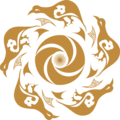In 1905, the Islamic Art Department of the Kaiser-Friedrich-Museum purchased a number of pieces of architectural decoration in the Parisian art market that hailed from “Central Asia”. Primarily these consisted of a terracotta niche border from the mausoleum of Buyan Quli Khan in Bukhara (late 14th century), and a calligraphic frieze made up of seven tiles from the portal of the mausoleum for Ulja Shad-i Mulk Aqa, built in 1371/1372, in the Shah-i-Zinda in Samarkand.
Both the border and the frieze have delicate carved relief patterns and are glazed in colors. The technique of carved glazed terracotta has a long tradition throughout Central Asia as a widespread form of architectural ceramics. Early examples are unglazed, but later colors become the dominant decorative elements.
We see on the pieces from the museum collection how the tiles’ relief surfaces are totally covered with glaze (turquoise, white and dark blue). The corner piece of the frieze depicts a spiral-shaped plant shoot with tendrils and leafs in islimi style, the other parts of the frieze display an exquisite Arabic inscription in the Kufic style on a background of vegetative designs. The inscription repeats the words al-mulk li-llah, “sovereignty belongs to God”. This white calligraphy is delicately drawn against the tile’s turquoise background. A small blue-and-white border completes the design of the frieze.
You can learn more about the topic in the book-album "Collections of the Federal Republic of Germany" (volume XI) in the series "Cultural Legacy of Uzbekistan in the World Collections".
The main sponsor of the project is the oilfield services company Eriell-Group.
_1_1.webp)
